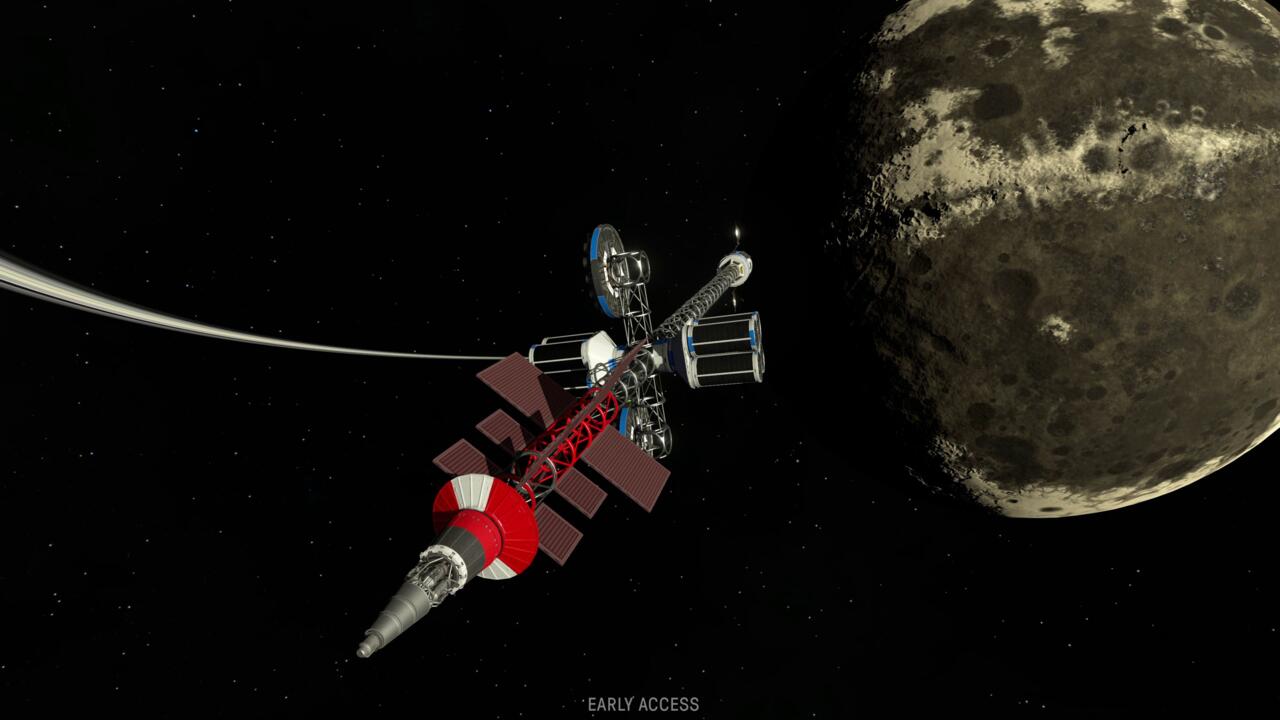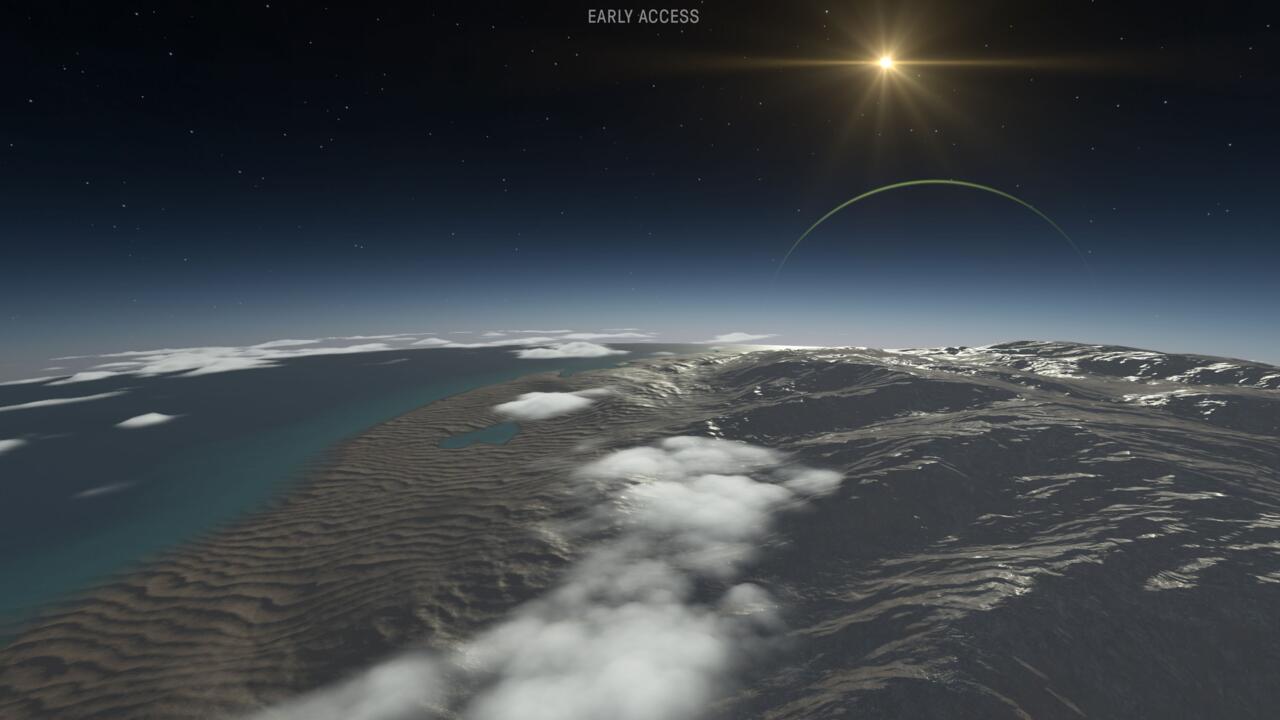The distance between Earth and the observable edge of the universe is 46 billion light-years. That’s such a massive amount of space that it’s impossible to comprehend. Some of the greatest minds on the planet are working tirelessly to make it possible for us to get to the nearest solar system–which is only 4.2 light-years away.
Kerbal Space Program 2 developer Intercept Games, believe it or not, is right there alongside scientists studying interstellar travel. It has been building a sequel from the ground up in order to make traveling across the universe possible in-game.
“One thing we’re noticing, especially with the more advanced technologies in the game is that we’re sometimes the first people to depict something because we’re trying to keep abreast of the latest research,” said Kerbal Space Program 2 creative director Nate Simpson. “Sometimes a piece of research will come very hot off the presses and we’ll have to figure out what it might look like and our depiction of this thing is going to be the only one for a while.”
Kerbal Space Program is an incredibly complex game with systems rooted in real science. Many future rocket scientists and astrophysicists have taken their first step in exploring space by building a rocket to send a silly little green humanoid into space in the first game.
That complexity is also the reason it can be so difficult to get into building rockets and flying through space. Its steep learning curve is more than enough to send first-time players running. That’s one of the main things that Intercept Games is hoping to change with Kerbal Space Program 2.
“Perhaps the reason Kerbal Space Program 2 even exists in my opinion, is to take another crack at making the core concepts of Kerbal Space Program access accessible to a broader audience,” Simpson said. “I want to be able to send a copy of Kerbal Space Program 2 to the same people I sent the first one to, and to have them have a relatively smooth ramp into the experience. That’s the number one thing.”
A short gameplay demo of Kerbal Space Program 2, launching in early access on February 24, 2023 showcased a new series of tutorials that guide players through the building blocks of rocket science. Each tutorial includes an animated video explaining the concept followed by a gameplay segment that has you complete a specific task. The tutorial includes guides for how rockets work, staging, launching and recovery, making and maintaining an orbit as well as information on things like the navball.
The tutorial is a pleasant way to jump into the game for the first time. Each video was entertaining, and it’s clear that Intercept Games put a ton of time into them–especially considering the studio scrapped hours of animation in order to craft what they believe to be the perfect tutorial. The jump from the tutorials to the sandbox mode, where you build a rocket from scratch and attempt to launch it, was still a considerable one.
If I hadn’t watched a walkthrough put on by Simpson himself, then I may not have been able to land on the mun, a fictional moon in Kerbal Space Program, at all. Despite the considerable efforts put into redesigning the UI and tutorials, the game is as complex as ever. The rewarding feeling once a ship is successfully in orbit, though, is especially satisfying as it was in the first game.

New ships, updated visuals, and other changes are some of the small additions that will be present on launch day. It may not seem worthwhile to jump into a whole new game for a new tutorial system, new UI, and a handful of other small additions, but that’s not the reason Intercept Games put out a sequel. Two of the most monumental additions, colony building and interstellar travel, aren’t possible in the first game.
“There was a huge amount of what is, I think at the moment, not highly visible work that’s going on in the sort of foundational technologies of the game,” Simpson said. “[They] will become much more obvious as we begin to put it through its paces and show people what it can really do.”
Simpson says that the rule of thumb for designing systems in Kerbal Space Program is the Wikipedia test. After launching a rocket into space, players can jump online to do research and find that their methods aren’t too far away from what happens when a rocket leaves Vandenberg Space Force Base in Lompoc, California. Interstellar travel, on the other hand, has never been achieved by humankind.
While interstellar travel, or manned or unmanned travel between stars, may not be possible yet, experts have been working to change that. Kerbal Space Program 2’s systems, fuel, and engines are based on research happening at places like the Lawrence Livermore National Laboratory.

Other new systems introduced in Kerbal Space Program 2, like colonies, will take more liberties. Simpson says the studio wants to balance “total realism and fun gameplay.”
There are no life-support systems in Kerbal Space Program, for example. These little green humanoids don’t need food and will sit in a ship as it blasts across space for years, perfectly content. Kerbal Space Program 2 won’t change that as it pushes deeper into space. The focus will be rocketry, especially when it comes to colonies.
“It’s all about resource utilization and having various factories connected to your colony,” Simpson said. “When you bring those raw resources and have the proper facilities you can synthesize fuels and materials that can then be used to construct new vehicles. It gets really interesting when in orbit, then you can make Star Trek-style space docks.”
Modders have added old Soviet spacecraft, rockets and turret guns, and autopilot systems since 2011. Who knows what they’ll be able to introduce with the colonies, interstellar, and overall more mod-friendly environment that Intercept Games plans to promote post-launch?
“If you think of Kerbal as a tree, rocketry is the trunk,” Simpson said. “We don’t want to limit people and we are often surprised by non-rocketry things that people manage to achieve in the game.”
The products discussed here were independently chosen by our editors.
GameSpot may get a share of the revenue if you buy anything featured on our site.
